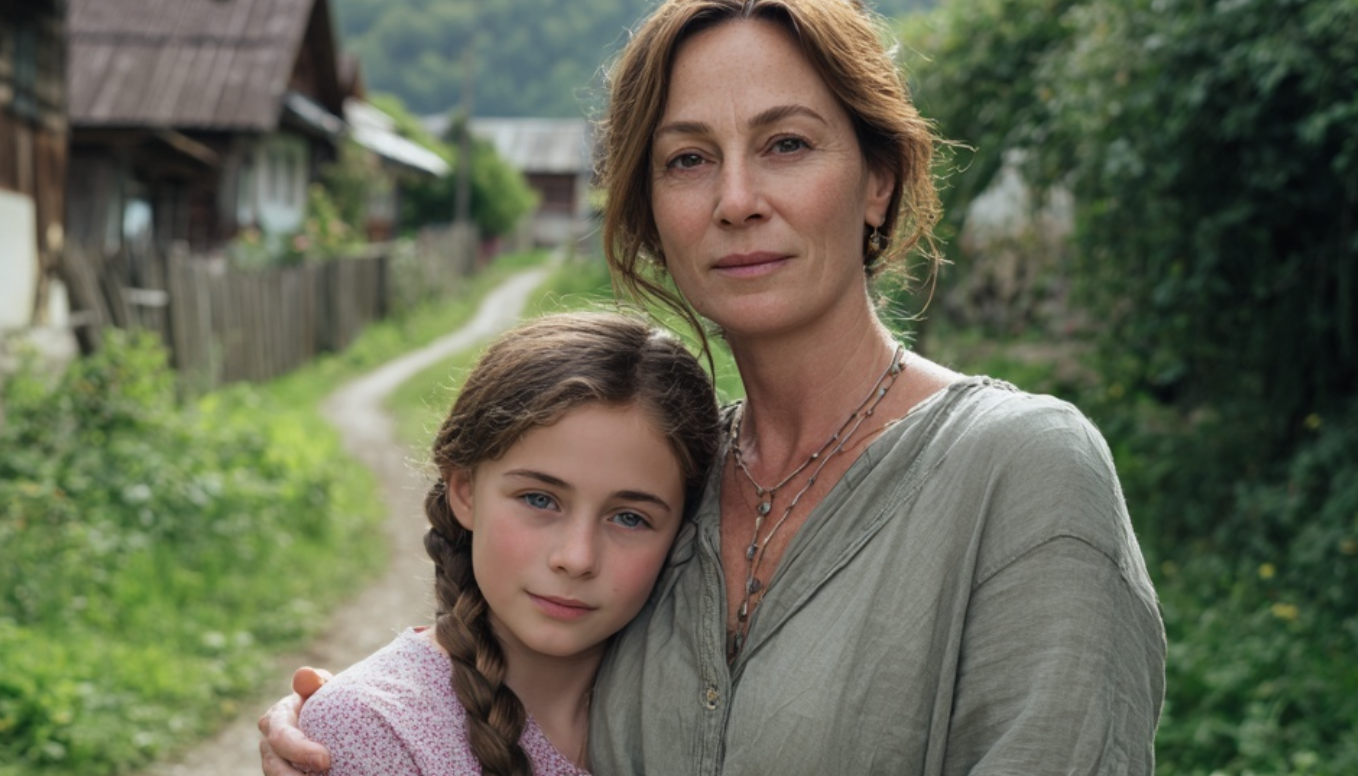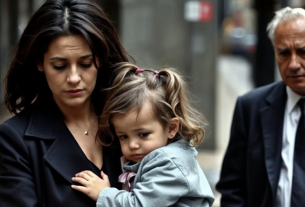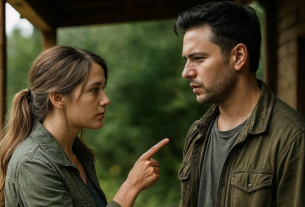The first sound forced its way through the thickness of a heavy, dead sleep like a rusty nail through rotten wood. Faint, thin, it was barely distinguishable from the creak of floorboards or the wind moaning in the stove pipe. But a mother’s heart—that tireless, eternal watchman—answered it instantly, clenching tight in her chest.
Arina didn’t open her eyes; she only listened, turning into one taut, straining ear. Her body felt like cotton, unresponsive after a short night full of oppressive dreams. It seemed she had only just closed her eyelids, and outside, in the frost-filmed pane of the little shuttered window, the sky had already shifted from black to a deep, saturated blue, as rich as the skin of a ripe blackberry. “Dawn soon,” a weary thought flickered. “Soon…”
And again—the same sound. Clearer now. Not even a groan, but a plaintive, broken exhale that barely managed to break through the deafening cacophony of snores filling the hut. Two were snoring: her husband, sprawled beside her, massive and motionless as a boulder, and her mother-in-law, settled on the warm bench of the stove. Her husband’s snore, Tikhon’s, was thick and rolling, like thunder rumbling before a downpour. It smothered and pressed, filling all the space. The old woman wheezed more softly, grumbling like a little dog dozing on the stove ledge.
Arina dreaded moving. The thought of getting up, lighting a splinter, and climbing to the sleeping loft made her recoil physically. Disturb the mother-in-law—and she would wheeze and complain about aching bones and lost sleep all day, casting sidelong looks at her daughter-in-law, as if it were Arina’s fault.
“Dreamed it,” Arina tried desperately to convince herself, pressing her cheek to the cool pillow. “It’ll pass. It always does…”
“Ma-am… ma… u-u-u…”
Arina’s heart lurched and stopped. She knew that little voice, steeped in pain and longing. It was calling her, and only her—her middle daughter, Alenka. She couldn’t lie there any longer. Carefully, with the grace of a well-fed cat in winter, Arina began to slip out from under the coarse blanket, trying not to jostle the mighty bulk of her husband. Pregnancy was her usual, almost constant state, making her movements awkward. She shifted clumsily, and her stiff braid accidentally lashed Tikhon across the face.
He twitched, blinked; his eyes flew open—wild, unseeing, full of night terrors. His hand, heavy and callused, instinctively clutched the edge of the bed.
“No! Didn’t drink, didn’t beat! Don’t push me, I beg you!” he rasped, his voice breaking with sleep.
“It’s me, love. The child is crying. Sleep,” Arina said softly, almost tenderly. She pulled the blanket up over him with a quick, light touch. Tikhon muttered something, turned helplessly onto his side, and almost at once began to snore again, as if he hadn’t woken at all.
For a moment a shadow of bitter, vengeful amusement flitted across Arina’s face. Only two years ago this scene would have played out differently. When Tikhon came home from a binge, the house turned into a branch of hell. He would beat her for no reason—“to limber up the bones,” as he cynically put it. The children’s cries drifting down from the sleeping loft only inflamed him. The older boys tried to shield their mother, and the mother-in-law, powerless to change anything, would raise a heartrending wail from atop the stove, as if mourning the dead. The whole family lived in constant fear of his sudden fits of rage.
“Bear it, little dove; where can you go? May his damned fists wither! He’s all his father, all that scoundrel of a father!” the old woman would lament later, smearing Arina’s bruises and scrapes with thick, sticky honey and wrapping them with rags. “May his afterlife be empty!”
The turning point came strangely, almost mystically. After one especially brutal night, when at last, exhausted and frightened, they all dozed off, drunken Tikhon crashed off the bed with a thunderous thud. The crash was as if the main beam had fallen. In a panic, Arina lit a splinter and heard his inarticulate cries, raw with animal terror:
“Get off me! Ow! Agh, it hurts! Take them away!”
In the tremulous light his face was contorted with superstitious fear. He crawled backward across the floor, fending off invisible attackers.
“They threw me! They trampled me! Who was that?!”
“With tiny feet!” he wheezed, then glared with savage fury up at the sleeping loft, where frightened children’s faces peered down at him. Everyone was there.
“You imagined it! You’re soused, you viper! Let people sleep!” the mother-in-law grumbled from the stove. “Or maybe devils trod on you for your grievous sins…”
The miracle repeated. Twice more, whenever Tikhon raised his hand to his wife, some unseen force would toss him onto the floor at night and methodically trample him, leaving bruises on his back. The third time, he already had his fist raised but froze; that same night fear flickered in his eyes. He only swore through his teeth and collapsed onto the bed. He slept peacefully that night. More than a year has passed since, and peace has reigned in the house. Tikhon seemed transformed. Arina blossomed; a calm, serene smile never left her face.
The neighbor women whispered that the domovoy—the house spirit—had taught the master a lesson, and advised her not to forget to thank the unseen protector. Arina did just that: she set a little pot of fresh milk behind the stove, left a crust of bread or, if she could get one, a sweet gingerbread, murmuring, “Thank you, grandfather domovoy, for your kindness. Help yourself, dear one.”
Coming up to the sleeping loft, Arina hesitated for a moment. She didn’t want to clamber over the stove and disturb her mother-in-law. She dragged over a stool, stepped onto it, and, groping in the dark among the children’s heads, asked softly,
“Who’s awake?”
“Mama… it’s me,” came Alenka’s weak, unfamiliar little voice. “I feel awful…”
“What is it, darling? Oh!” Arina’s palm touched the child’s forehead and she gasped, recoiling. “You’re burning up like a live coal!”
“I’m shivery… My throat hurts, I can’t breathe… And all my bones are being twisted…”
Sighing helplessly, Arina put a spoonful of honey in her daughter’s mouth, told her to let it melt, tucked an extra sheepskin over her, and went back to bed. But sleep wouldn’t come. In the morning Alenka was worse. To care for her, the mother laid the girl on her own bed. Neither vinegar rubs, nor herbal teas, nor raspberry jam helped. The cold was bitter, and the zemstvo hospital was more than an hour’s walk away. Tikhon was afraid to take the child in the cart, fearing she’d catch an even worse chill. For two long nights Alenka tossed in fever and raved; her breathing grew heavier, raspier. It seemed there was no room left in her lungs for air.
Arina sat beside her, powerless, wiping her daughter’s burning brow with a damp rag, whispering prayers tangled with folk charms. Alenka, sinking into oblivion, felt life slowly ebbing from her small body. She could no longer call out, could no longer move. And at that moment of absolute helplessness she felt someone lightly, insistently tickling her soles. From somewhere she found the strength to raise her head, heavy as cast iron.
At her feet stood a short, stocky little man, only a bit taller than a cat. He looked as if he were made of matted moss and old wood: shaggy, tousled, with a thick, bristling beard the color of ripe rye. He wore a red shirt of homespun cloth, and from under bushy brows two stern, yet not at all evil, coal-black eyes looked at the girl. Alenka wasn’t afraid. Not a bit.
“What’s this, mite, going all soft on me? Decided to get sick?” he growled in a voice like the creak of an old stump.
Alenka couldn’t answer; her tongue wouldn’t obey.
“All right, that’s enough,” the little man grumbled peevishly. “Strike’s over. Up you get tomorrow; no more wilting.”
He put something soft at her feet, turned, and melted into the air like smoke from Grandpa’s tobacco pouch. Alenka dropped onto the pillow and instantly fell into a deep, saving, healing sleep.
In the morning she woke completely well. The weakness was gone; her chest breathed light and free, her throat didn’t hurt. She immediately remembered the night visitor and thrust her hand under the blanket. Her fingers touched something cloth and warm. A doll. Homely, homemade, yet so dear.
“Mama! I’m better! The domovoy cured me!” she cried, running to the stove where Arina was fussing with the pots.
Tikhon, finishing his sleep on the bench, popped his eyes open at the word “domovoy,” as if on command. At first Arina didn’t believe it, dismissing it as fever and childish fancy, but then Alenka solemnly held out her find.
“Look! He put it there for me! A magic one!”
Arina took the doll, and her face went white. She recoiled as if she had seen a ghost and sank heavily onto the bench beside her dumbfounded husband.
“Where… where did you get this?!”
“I told you—he put it at my feet!”
“Good heavens… it can’t be,” Arina whispered, turning the doll reverently in her trembling hands. “Why, this is—her… my Palanechka! I made her myself when I was a girl! I tied her for luck, for health, for fortune… How I searched for her when I married and moved to my in-laws’! I turned the whole chest inside out—nothing! As if she’d vanished into the earth!”
Alenka stared wide-eyed at her mother; Tikhon eyed the rag treasure with disbelief.
“So the grandfather domovoy must have taken her back then,” Arina went on, her voice shaking with awed tremor. “And now he’s returned her to you. Seems, Alenka, your health and your happiness mattered more to him. He took pity on you, poor little thing. Now she’s yours. Guard her closer than your own eyes.”
Alenka received the doll like the greatest of sacred things. Palanechka had no face, only a hint of features worn away by time. On her head— a blue kerchief; on her body—a red pinafore dress; to the sides stuck out soft arms stuffed with rag.
“And don’t forget to pour him some milk, dear heart,” Arina reminded her. “Say: ‘Thank you, grandfather domovoy, for giving me my health back.’”
Alenka was eight then. For the next eight years, right up to her sixteenth, Palanechka was her truest and most secret friend. She kept her under her pillow, took her along to the river or into the forest for berries. She shared with her the most intimate thoughts, the boldest dreams, the bitterest grievances. The doll, of course, kept silent. But Alenka often felt it was that faceless little head that suggested the right decisions, and at night she felt a light, soothing touch on her forehead, as if someone unseen and kind were smoothing her hair.
At sixteen, answering the call of a new life, Alenka left for the big city—Perm. Pretty, modest, and quick-witted, she soon found a place as a maid in the household of a local professor. A white apron, strict routine, parquet and silver gleaming. She learned to serve at table, to help the mistress and her daughters dress, to open the door to guests. By summer the family prepared to go to their dacha. In the bustle of packing, stuffing things into baskets, Alenka discovered with horror that Palanechka was missing. She turned over all her few belongings—the doll had disappeared. The very next day Alenka took to her bed with a raging fever. The doctor pronounced the dreadful diagnosis—typhus.
Her employer, a kind man, had her admitted to the hospital. Lying on a cot, in delirium and heat, Alenka was certain this was the end. Without her talisman she would not survive. For two weeks she teetered on a thin edge between life and death; then the crisis passed. Slowly, painfully, she began to recover. She spent almost a month within those walls. Strong enough at last, she was taken straight to the dacha, and those two warm, serene months remained in her memory as an oasis of calm before the storm to come.
And the storm broke that very autumn. It broke in the thunder of guns, the clash of bayonets, and the flame of revolution. The Great October turned everything upside down. The professor’s family, seized by panic, fled in haste, dissolving in the chaos of the times. Alenka didn’t return to her native village. She met a young Red Army soldier with ardent eyes and went with him. In the wild years of the Civil War she often recalled her typhus with cold horror and inwardly thanked fate that she had suffered it before the sickness swelled into a relentless, sweeping epidemic mowing down entire regiments and towns.
She lived a life as long as an era. A village girl who slept on a stove loft and wore bast shoes became a witness to incredible change: revolution, the fall of an empire, the Great War, the country’s rebuilding… She outlived all the leaders of the USSR, watched in amazement as humans flew into space and split the atom. Even the first president of the new Russia was elected in her lifetime. Right up to grey hair, to eighty-three, she worked as a modest technical employee at the Institute of Nuclear Physics—the keeper of some astonishing archive. She raised four children, saw eight grandchildren, and lived to greet many great-grandchildren.
She passed away in 2001. She was ninety-nine. To her last day she kept a clear mind and crystalline memory. Her favorite story—the one she told to grandchildren pressed against her knees—was about the rag doll Palanechka and the stern but just Grandfather Domovoy. All those long years she secretly cherished a faint, quiet hope that the guardian would one day return her talisman.
“In a house that has a domovoy,” she used to say, “it always smells of pies, it’s always cozy and warm. That’s the kind of house you always want to come back to.”
The children were absolutely certain that he did live in Grandma Alena’s apartment. Because you never wanted to leave their grandmother, and the air there was filled with a special, kind, bright calm.
One day her grown granddaughter complained:
“Grandma, there’s definitely no domovoy in our new apartment. One day a pipe bursts, then the wiring shorts, then the cat makes a mess wherever he pleases. Nothing but trouble!”
The old woman smiled her wise smile.
“Then try luring him. In our village we had an old custom. You’d take an old felt boot, tie a string to it, and go out on the porch at the full moon. Drag it behind you and call: ‘Domovoy, come live with us! Good fare and peace await you!’ The main thing is not to look back and not to look at the boot until you’ve crossed your threshold. Try it with an ordinary slipper on a string.”
“Grandma, what if something… else comes?” the granddaughter asked, frightened.
“I was a believer, and I respect science, but this I believe in,” the old woman shook her head. “It’s in my mother’s milk. Do as you think best.”
For the granddaughters, her stories were lovely, but only fairy tales. How stunned they were when, after her quiet, peaceful passing, they found her in bed. Her face was wonderfully calm, serene, and on her lips lingered a faint, barely perceptible smile of peace finally attained. And in her open palm, cross-hatched by years, lay that very rag doll they knew from countless tales. Faceless, in a faded blue kerchief and a washed-out red pinafore. Scarred by time, yet whole. Palanechka. She had returned to her mistress at the most important, last moment of her long, long road.
And in the room’s stillness it suddenly seemed to smell of fresh-baked bread, baked milk, and the warm resin of the stove. As if someone large, kind, and unseen had walked into the house to see her safely on her last journey.



